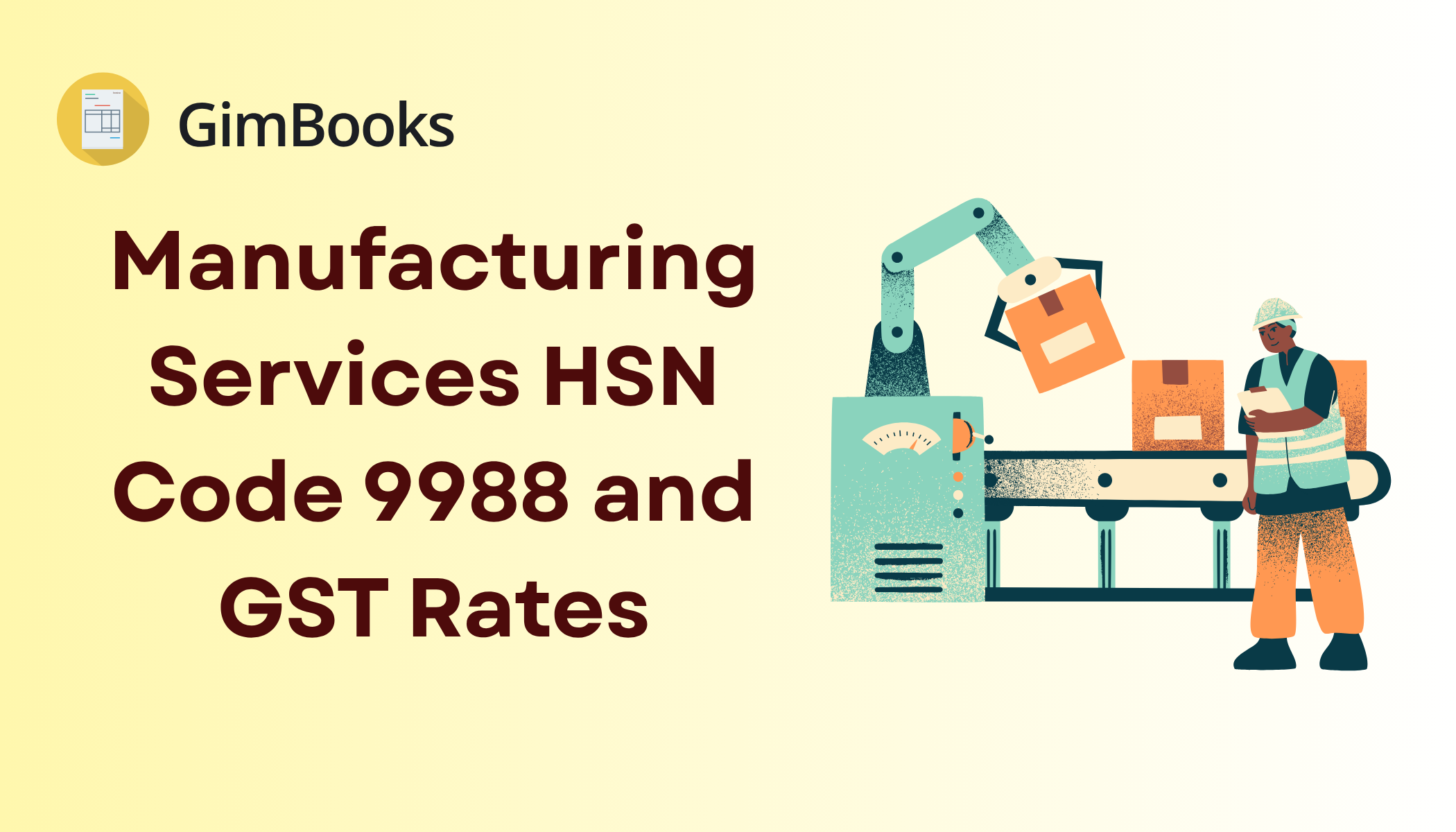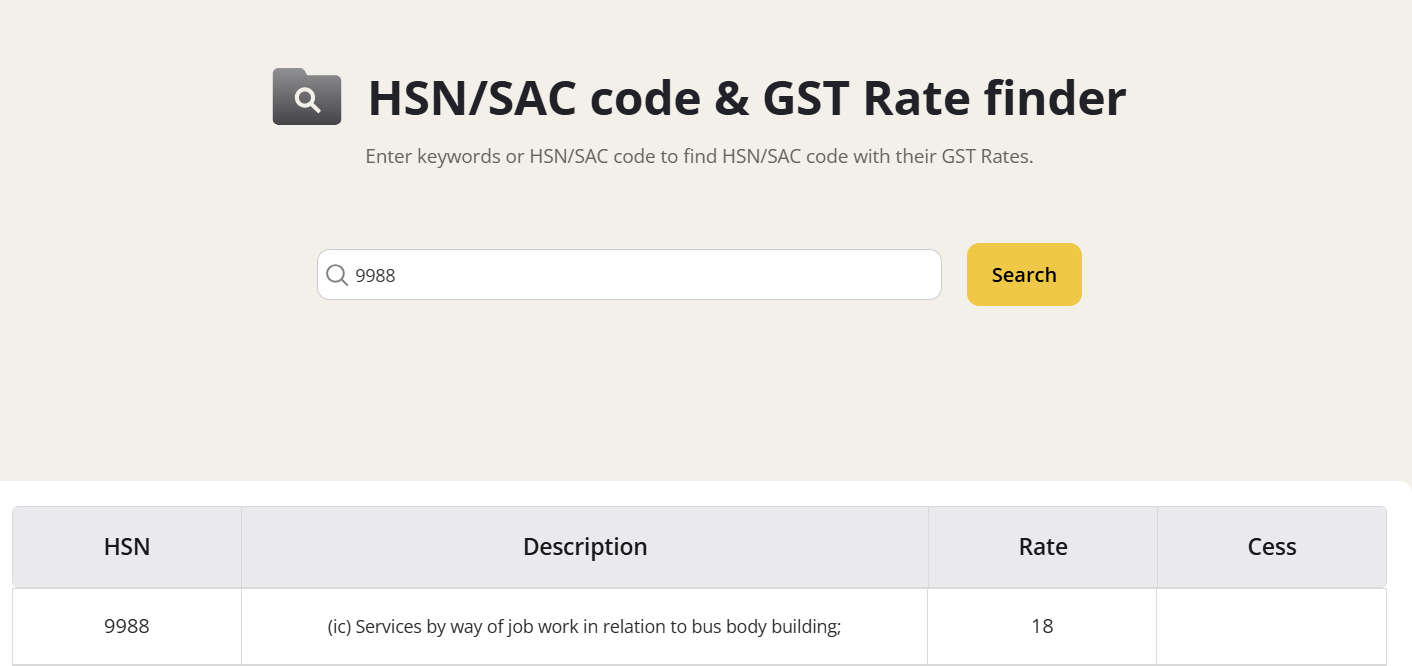Manufacturing Services HSN Code 9988 and GST Rates

Understanding Manufacturing Services HSN Code 9988 is crucial for businesses engaged in job work or contract manufacturing. The 9988 HSN code GST rate determines how GST is applied to services where a manufacturer processes, assembles, or handles goods owned by another party. Knowing the job work HSN code or job work SAC code helps companies comply with tax regulations and ensures smooth invoicing for processing, finishing, or packaging services.
What is HSN Code 9988?
HSN Code 9988 covers “Manufacturing Services on Physical Inputs (Goods) Owned by Others.”
This includes all forms of job work or contract manufacturing, where a registered manufacturer (the job worker) performs processing, assembly, or production on inputs or goods owned by another person (the principal manufacturer).
In simple terms, any service provider performing processing, finishing, fabrication, or packaging of goods that belong to someone else falls under this SAC code. The 9988 HSN code GST rate naturally varies depending on the type of job work or goods involved, as specified under GST regulations.
Common examples are:
- Textile dyeing, stitching, or printing services
- Vehicle body-building services
- Goldsmith services for jewelry fabrication
- Leather tanning or cutting work
- Processing of raw materials like steel, plastics, or rubber under contract
GST Rates & Exemptions for HSN Code 9988
Under GST, services under HSN/SAC 9988 can attract 1.5%, 5%, 12%, or 18% GST, depending on the type of manufacturing activity and government notifications.
The standard GST rate for most job work services stands at 18%, effective 22nd September 2025, after the rationalization of earlier 12% rates. Certain industries continue to enjoy concessional rates (5% or 12%) based on their classification under the Customs Tariff Act.
Table Notes
- The rate structure under SAC 9988 is activity-based, not uniform.
- Services involving food, textile, jewelry, printing, and leather generally attract lower rates (5% or 12%).
- Heavy industries and mechanical or electronic manufacturing fall under 18%.
- No compensation cess applies to any job work or manufacturing services.
GST Rates Applicable Under 9988
(Updated as per GST Notification and Job Work Rate Revision, September 2025).
What’s Included Under HSN 9988 Manufacturing Services?
SAC 9988 primarily includes processing services where the raw materials or semi-finished goods are owned by the client (principal), and manufacturing or finishing work is carried out by another person (the job worker). Key inclusions:
- Textile & Apparel Processing – dyeing, cutting, sewing, or embroidery
- Engineering & Fabrication – metal treatment, welding, or component assembly
- Printing & Packaging Work – newspapers, stationery, or branded labels
- Food & Beverage Processing – milling, packing, and quality testing
- Pharma & Chemical Processing – blending, bottling, and compounding
Such manufacturing is treated as a service under GST, not a goods supply.

Explore Gimbooks HSN/SAC code & GST Rate finder
Key Exemptions Under GST for Manufacturing Services
Certain manufacturing and job work services are exempt or attract reduced GST rates to promote primary sector and MSME growth:
Input Tax Credit (ITC) Rules for Manufacturing & Job Work
Under GST law (Sections 19 & 143 of the CGST Act), both the job worker and principal manufacturer are allowed to claim Input Tax Credit (ITC) on inputs/tools used in job work, provided certain conditions are met:
ITC Eligibility
- The principal can claim ITC on inputs sent to the job worker.
- Goods must return to the principal’s premises within 1 year (inputs) or 3 years (capital goods).
- Job workers registered under GST can claim ITC on services used for processing.
- Both parties must maintain Form GST ITC-04 to track material movement.
ITC Restrictions
- No ITC for goods consumed for personal use or non-business purposes.
- Delay in returning goods beyond the prescribed period treats the transaction as supply, making it fully taxable.
Example:
If a textile company sends raw fabric worth ₹5,00,000 for dyeing, and the job worker charges ₹50,000 + GST (5%), the textile company can claim ITC of ₹2,500 (5% of ₹50,000) as long as the finished goods are received back within the statutory period.
GST on Manufacturing Services: Practical Scenarios
- Example 1:A metal fabrication firm creates molds for a client under SAC 998873 → GST at 18%, full ITC claimable by principal.
- Example 2:A tailoring unit sewing garments from provided material falls under 998822 → 5% GST.
- Example 3:A dairy product subcontractor processing milk → 998815 → 18% GST.
- Example 4:A jeweler manufacturing ornaments for another brand → 998892 → 12% GST.
These scenarios help clarify how specific rates apply depending on the type of job work contract.
Common Mistakes in Manufacturing Services GST
- Using wrong SAC codes (mixing 9988 with trading or repair service categories).
- Charging a flat 18% rate instead of checking concessional job work rates.
- Delayed submission of ITC-04 forms tracking material flow.
- Claiming ITC for goods not returned within the allowed period.
- Misclassifying job work as the supply of goods instead of services.
Conclusion
HSN Code 9988 simplifies classification for job work and contract manufacturing services covering a wide spectrum of industries — from textiles to heavy machinery. With GST rates between 5% and 18% and clear ITC eligibility, compliance and cost management become convenient for manufacturers outsourcing production. Businesses must ensure proper SAC code usage, ITC tracking, and GST returns (ITC-04) to remain audit-ready under the 2025 GST framework.
Also explore
FAQs: Manufacturing Services under HSN 9988
What is HSN 9988?
It refers to manufacturing or processing services on physical inputs owned by others, commonly known as job work under GST.
What is the GST rate for SAC 9988 manufacturing services?
It ranges from 1.5% to 18%, depending on the service type, with 18% being standard for general manufacturing.
Can job workers claim ITC?
Yes. Both job workers and principals can claim Input Tax Credit under Sections 19 & 143 of the CGST Act, subject to documentation.
Is tailoring considered manufacturing service?
Yes, tailoring is listed under SAC 9988 and taxed at 5% GST.
What happens if goods sent for job work aren’t returned?
If not returned within the prescribed period, the goods are treated as a deemed supply, and GST becomes payable.
What is the job work HSN code?
The job work HSN code, also known as the job work SAC code, is HSN Code 9988, which covers manufacturing services on physical inputs or goods owned by others. It specifies the applicable GST rates for processing, assembly, or contract manufacturing.
